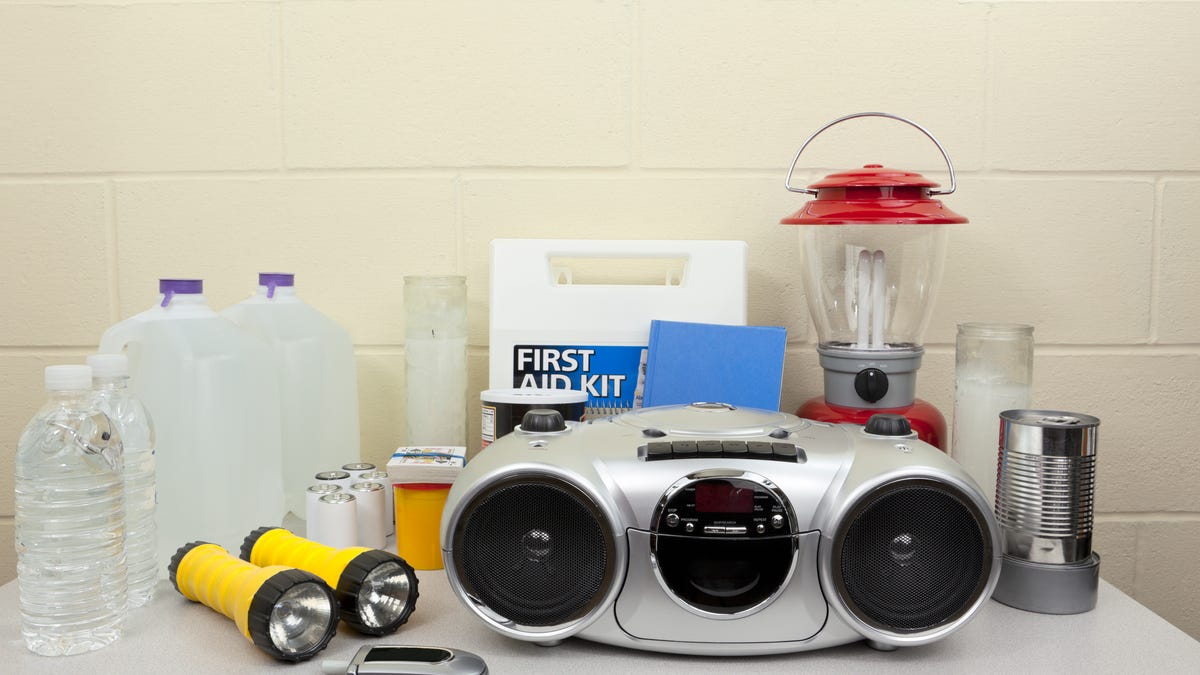 Why You Can Trust CNET
Why You Can Trust CNET Winter Storm Guide: What to Stock Up on for Snow, Ice and Power Outages
With a nor'easter about to hit the east coast, it's best to prepare for snow, ice and power outages now. These are the essentials you should stock up on.

Gather items you can use during a winter storm ahead of time.
When winter hits, it hits hard. Extreme cold and winter storms can have serious impacts, including knocking out your electricity.
A brutal nor'easter is expected to cut a swath across the northeastern US on Feb. 13, potentially culminating in the heaviest snowfalls the region has seen in two years. This weather system has already caused thunderstorms and flooding in much of the southeastern US, and 22 states have put out winter weather warnings.
New York, New Jersey, Connecticut, Massachusetts and Pennsylvania are expected to see heavy snowfall and wind gusts as strong as 40 mph. Travel advisories have been issued, urging people to stay indoors whenever it's possible.
If you're without power or trapped inside because of massive snowfall, you'll want to make sure you have a full stash of supplies to make it through this nor'easter. Here are the items you should stock up on to prepare for a winter storm.
Winter weather essentials:
For more storm preparedness tips, you can also check out how to keep your refrigerated food from going back during a power outage and how to keep your pets safe and calm during a winter storm, and find out what damage from a storm your home insurance will cover.
Canned foods and nonperishables
When a storm comes, it's important to make sure you have food that can get you through. If the power goes out, the perishables in your refrigerator and freezer might not survive. That means you'll need to have options that will last. Nonperishable foods like dried fruits and vegetables, nuts, crackers and cereal can all last through the cold and require little to no preparation to eat.
Likewise, canned foods have a much longer shelf life than fresh ones and don't have to be heated up to eat -- though they'd probably taste better if you can find a way to warm them up. Just don't forget to pick up a can opener, too, so you can crack open your cache of cans when you need them.
Water
While food is important to keep you going through a storm, water is absolutely essential. Humans can technically survive for a couple weeks without food, but would only last a few days without consuming water.
And while you might think you can just eat some snow to stay hydrated, the fact is that eating snow actually makes you dehydrated. Stash some water for the winter so you can stay hydrated and healthy. Ready.gov recommends keeping a gallon of water per person per day in order to ensure you have enough water available to keep the whole household hydrated. Factor in extra if you have pets to care for.
Batteries and fuel
If the power goes out, you don't want to be left in the dark -- at least not entirely. For that reason, it's important to have backup sources of energy. This is where batteries and fuel, as well as backup electronics. come in handy.
You'll want to have a battery-powered flashlight and radio available, as well as batteries to power them. Check what type of batteries these devices use so you know that you have a stash to keep them running. If you have a fuel-powered generator, you should have an extra can of gas to fill it up and keep it operating. This is especially important if the generator is keeping you warm through a power outage, as extreme cold weather can be dangerous.
Also make sure you follow the instructions closely if you have a generator, as improper use can lead to carbon monoxide poisoning.
First aid essentials
If you're unable to leave your home because of a storm and suffer an injury of any sort, you're going to want to be able to take care of it. Bandages, gauze wraps, painkillers, tweezers, hydrocortisone ointment and hand sanitizer should all be in your kit.
Also, make sure you stock up on any essential medications that you have. Keep at least a week's supply of them available in case a storm hits and leaves you unable to get your prescription refilled.
Blankets, towels and warm clothes
If you're without power or electricity during a winter storm, you're going to be exposed to some very cold temperatures. To combat that, make sure you have plenty of materials available to stay warm.
That includes clothing that you can layer, including a first layer that can wick away sweat that could otherwise freeze on your body. Also pick up wool blankets, and consider getting an emergency Mylar blanket, as it can help retain up to 90% of body heat.
Winter storms can be brutal -- and if you aren't prepared, they can even be deadly. Extreme cold exposure kills more people each year than any other weather condition, according to data from the Centers for Disease Control and Prevention. Stocking up on essential items and preparing for a winter storm isn't just a matter of comfort when winter comes, it's a matter of survival. Keep yourself and your family safe: All it takes is a little preparation.
If you're looking for ways to save money on heating and electricity through the winter, consider using your ceiling fan to move warm air to you and unplugging appliances. It turns out small changes can make a big difference.
For more information on tracking this nor'easter, read more about the Weather Channel app's recent upgrade.